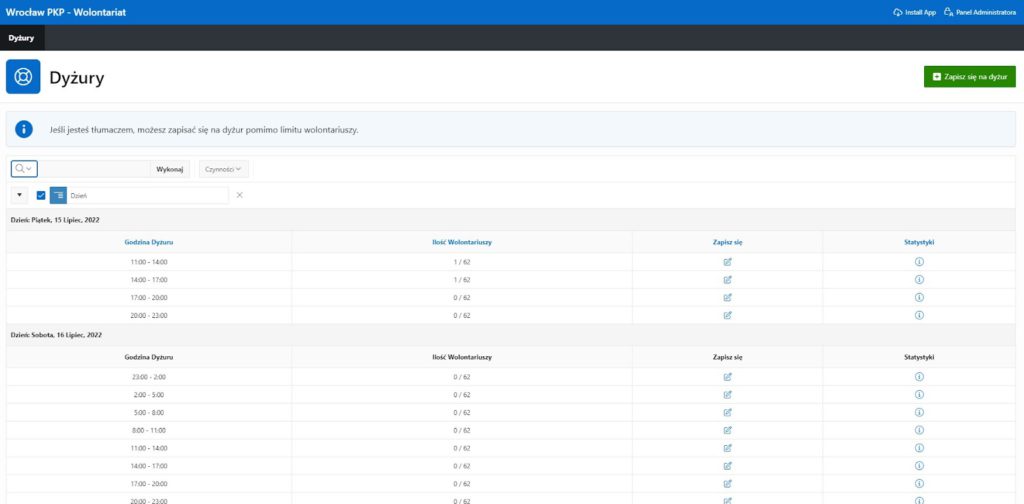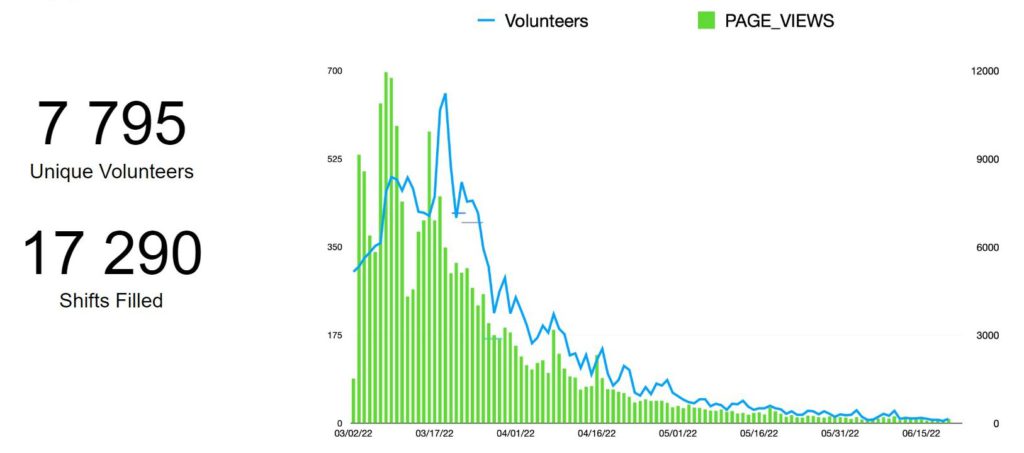Creating software is usually a slow, arduous process. Making a full-fledged application can take months, years even. But sometimes life requires you to move a lot faster than that. How to do that? Why a low-code development platform may be the best answer? Here’s a story of a few Polish charities that – with the aid of Oracle APEX development – managed to help thousands of Ukrainian refugees in the first half of 2022.
Dire circumstances create dire needs
On February 24th, 2022, the Russian Federation invaded the independent country of Ukraine, starting what soon turned out to be a ruthless and vicious war – the kind Europe hasn’t seen in decades. Most of the world was in shock that day. Poland – being Ukraine’s neighbor, with its own tragic history – especially.
Over the next 3 weeks, more than 2 million Ukrainians left their homes to save their lives. For various reasons (ethnicity, familial ties, geography etc.) most of them moved to Poland. After the initial shock, the Polish people quickly understood the refugees will need their help – and started organizing that help on an unparalleled scale. Countless people flocked to the border to offer food, clothes, medicine, transportation, and other things – pretty much whatever they could do or spare. Cities in different parts of the country also started forming shelters – usually at train stations – and coming up with ways to deal with the sudden crisis.
However, in such situations, good intentions usually aren’t enough. The sheer number of people – both those who needed help (refugees) and those who wanted to provide it (volunteers) – quickly created logistical problems. Managing aid and making sure nothing was wasted was very difficult, sometimes impossible.
The limitations of non-specialized software solutions
Management difficulties resulted in:
- Wasted resources – often too many volunteers found themselves in one place, while they were needed elsewhere, and the same was true of material resources. Food spoils quickly, especially if there’s no way to store and cool it properly. Medicine also has expiration dates
- Wasted time – administrators spent a lot of time on fixing communication problems and mistakes
- Problems with feedback & tracking – people who managed the aid effort had no effective way to provide volunteers with feedback and track what was happening
Of course, people tried to employ tools and technologies that they know and use on a daily basis – mainly phones, e-mails, and Excel or Google Sheets files. However, these could only go so far. There were two main problems with that approach:
- Constant overwriting – sure, the cloud allows multiple people to access the same file, which is great, but when these people are counted in thousands, the spreadsheet is constantly being overwritten, important details get deleted, and it becomes extremely difficult to track these changes
- Privacy concerns – there’s also the problem with privacy. Tools like spreadsheets don’t really provide you with specific GDPR-focused functionalities, and charities had to ensure GDPR compliance (as Poland is part of the European Union). They needed a way to ask for permission to gather the volunteers’ data, and when that permission was given, that fact had to be registered by the platform
The application that was made in 2 hours
On March 2nd, 2022, the Foundation Ukraine asked for help on SoDA’s (Software Development Association Poland) Slack channel. They wanted to know whether Polish software houses could help them out somehow with the management of volunteers in Wroclaw. An hour later, the CEO of Pretius Low-Code – Przemysław Staniszewski – spoke with them over the phone to better understand what was required.
Five Pretius developers started working on this at 7 PM that day, using the Oracle APEX low-code platform. A couple of hours later – literally – the application the Foundation Ukraine needed was ready. Testing it and taking it to production took a few hours more – the app was made available to volunteers at 1 AM, on March 3rd.
The application offers the following features:
- It’s a place where all the volunteers interested in helping out can sign up for shifts on specific days and hours. It’s as simple as clicking a button and filling out personal information and contact details
- Administrators can specify the skills and capabilities of people needed on shifts so that all of the various needs could be covered
- The app is customizable when it comes to details such as the duration of shifts, and the total number of people. Administrators can also specify how many volunteers with specific skills are needed during a given shift. Others (e.g., the people who speak the Ukrainian language) can be excluded from these limits
- Administrators can filter out people who signed up but didn’t come
- The application automatically sends emails with a Volunteer’s Guide and an option to sing out, in case people want that. It’s worth mentioning that Oracle helped us out tremendously here – they’ve understood the gravity of the situation and removed the limit on the number of free emails that can be sent daily (normally it’s 50)
- The solution is GDPR compliant so the sensitive data of the volunteers is protected
During the most critical weeks, the app was used by a lot of people – you can see a couple of statistics on the chart below. We don’t show this to brag, only to illustrate how well the low-code technology worked. In fact, we’re very happy so few people use the app right now, after a few months, because it means such tremendous help is no longer needed.
It’s also worth noting that the app is open-source and completely free to use. Seeing how it helped the good people at Foundation Ukraine, we announced on our social media channels, that any charity with similiar needs can contact us for help. And many did. Modified versions of the original app got adopted by organizations such as the Umbrella Foundation, UA Grochowa Stop, and Wroclaw Integration Center. It also found use in different circumstances – not just to help out refugees at train stations, but also those who managed to find temporary homes and had difficulties adapting to their new life situation.
Update: On September 29th 2022, the low-code application which we developed for Foundation Ukraine received the SoDA Award 2022 in the category “An IT project that supported Ukraine”. This accolade is especially important to us, as it is handed out by Software Development Association Poland – the community of Polish software houses. Thank you for recognizing this project, SoDA!
Why low-code? The true benefits of low-code development platforms
It’s important to stress one thing out before this article is concluded: we didn’t do anything special here. Countless companies did what they could to help out, and we just saw a way we could utilize our skills. Also, the app wasn’t made that quickly because we’re so fast and incredible. Sure, we’re professional developers, and we have substantial experience with app development, but that’s not the point.
Any competent team of low-code developers could’ve done the same because this is simply how this technology works.
Low-code platforms offer many advantages. For example, they make the application development process exponentially faster by limiting the amount of coding required, and allowing regular people – so-called citizen developers – to take a more proactive role.
This is what low-code tools have to offer and how they will change the IT landscape in the coming years. It’s not only about giving business users a tool that’ll allow them to save time and money. It’s also about making people’s lives better by offering them a way to react very quickly and adapt to circumstances they couldn’t have foreseen.
Disclaimer: Most of the articles on our blog have a contact form at the end – to let potential clients send us sales inquiries. However, given this article’s nature, we decided to turn the contact form off. Should you want to drop us a line regarding any matter, please see the Contact us section. Thank you for understanding.

